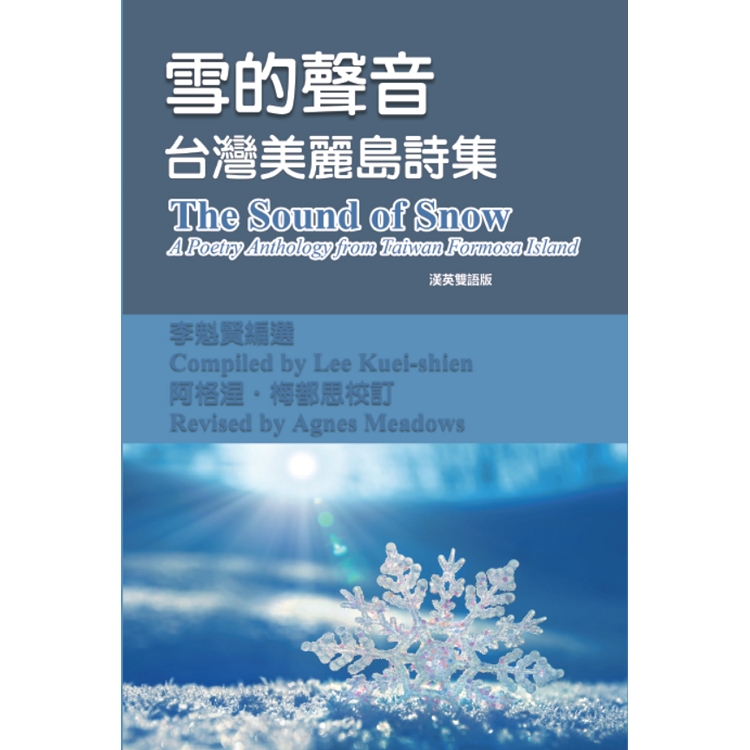雪的聲音(漢英雙語版)
The Sound of Snow (English-Mandarin Bilingual Edition)
活動訊息
內容簡介
本書集結11位元詩人作品,分別是李魁賢、利玉芳、謝碧修、李昌憲、林鷺、蔡榮勇、陳明克、林盛彬、陳秀珍、王韶君、楊淇竹(依據文章排列順序)。
This Poetry Collection contains of works by eleven Taiwanese poets: Lee Kuei-shien, Li Yu-fang, Hsieh Pi-hsiu, Lee Chang-shieng, Lin Lu, Tsai Jung-yung, Chen Ming-keh, Lin Sheng-bin, Chen Hsiu-chen, Wang Shao-chun and Yang Chi-chu.
This Poetry Collection contains of works by eleven Taiwanese poets: Lee Kuei-shien, Li Yu-fang, Hsieh Pi-hsiu, Lee Chang-shieng, Lin Lu, Tsai Jung-yung, Chen Ming-keh, Lin Sheng-bin, Chen Hsiu-chen, Wang Shao-chun and Yang Chi-chu.
名人推薦
(1) 李魁賢,1937年生。出版《李魁賢詩集》6冊、《李魁賢文集》10冊,《名流詩叢》35冊等,其中《黃昏時刻》有20餘種語文譯本。
Lee Kuei-shien(b. 1937)has published “Collected Poems, 2001” in six volumes, “Collected Essays, 2002” in ten volumes, ”Elite Poetry Series, 2010~2019” in 35 volumes. His book “The Hour of Twilight” has more than 20 different language versions.
(2) 利玉芳,1952年生。出版詩集《活的滋味》(1989年)、《向日葵》(1991年)、《淡飲洛神花茶的早晨》(1996年)、《燈籠花》(2016年)等。
Li Yu-fang(b.1952)has published “The Taste of Living, 1989”, “Sunflower, 1991”, “The Morning to drink Roselle Tea, 1996”, and “Lantern Flower, 2016”, and others.
(3) 謝碧修,1953年生。出版詩集《謝碧修詩集》(2007年)和《生活中的火金星》(2016年)。
Hsieh Pi-hsiu(b.1953)has published “Collected poems of Hsieh Pi-hsiu, 2007” and “The Sparks in the Life, 2016”.
(4) 李昌憲,1954年生。出版《加工區詩抄》(1981年)、《生態集》(1993年)、《生產線上》(1996年)、《愛河》(2018年)等。
Lee Chang-hsien(b. 1954)has published “Poems of the Processing Zone, 1981”, “Ecology Collection, 1993”, “On the Production Line, 1996”, “Love River, 2018” and others.
(5) 林鷺,1955年生。出版詩集《星菊》(2004年)、《遺忘》(2016年)、《為何旅行》(2017年)和《忘秋》(2017年)。
Lin Lu(b.1955)has published “Star Chrysanthemum, 2007”, ”Lost in Time, 2016”, “For What to Travel, 2017”, and “Forgetting Autumn, 2017”.
(6) 蔡榮勇,1955年生。出版詩集《生命的美學》(1986年)、《洗衣婦》(1994年)和《念念詩穎》(2018年)。
Tsai Jung-Yung(b. 1955)has published “The Aesthetics of Life, 1986”, ” Washerwomen, 1994” and “Continuous Thoughts of Sherrie, 2018”
(7) 陳明克,1956年生。出版詩集《地面》(1990年)、《歲月》(2000年)、《天使之舞》(2001年)、《暗路》(2005年)、《掙來的春天》(2005年)等。
Chen Ming-keh(b. 1956)has published “The Ground, 1990”, “Years, 2000”, “Dance of Angel, 2001”, “Dark Road, 2005”, and “Earned Spring, 2005”.
(8) 林盛彬,1957年生。出版詩集《戰事》(1988年)、《家譜》(1991年)、《風從心的深處吹起》(2002年)、《觀與冥想》(2010年)、《風動與心動》(2012年)等。
Lin Sheng-Bin(b. 1957)has published “The War, 1988”, ”The Family Genealogy, 1991”, ”The Wind blows from my deep heart, 2002”, “Contemplate and Meditate, 2010”, “Blowing wind and Beating heart, 2012” and others.
(9) 陳秀珍,1960年生。出版詩集《林中弦音》(2009年)、《面具》(2016年)、《保證》(2017年)、《不確定的風景》(2017年)、《淡水詩情》(2018年)、《骨折》(2018年)等。
Chen Hsiu-chen(b. 1960), has published “String Echo in Forest, 2010”, ”Mask, 2016”, “Uncertain Landscape, 2017”, “Promise, 2017”, “Poetry Feeling in Tamsui, 2018”and “Frcture, 2018”.
(10) 王韶君,1980年生。經常在《台灣現代詩》發表詩作。
Wan Shao-chun(b. 1980)has contributed her poems to “Taiwan Modern Poetry” frequently.
(11) 楊淇竹,1981年生。出版詩集《生命佇留的,城與城》(2016年)、《夏荷時節》(2017年)和《淡水》(2018年)。
Yang Chi-chu(b. 1981)has published “Living Among Cities, 2016”, “In the season of Summer Lotus Blossom, 2017” and “Tamsui, 2018”.
Lee Kuei-shien(b. 1937)has published “Collected Poems, 2001” in six volumes, “Collected Essays, 2002” in ten volumes, ”Elite Poetry Series, 2010~2019” in 35 volumes. His book “The Hour of Twilight” has more than 20 different language versions.
(2) 利玉芳,1952年生。出版詩集《活的滋味》(1989年)、《向日葵》(1991年)、《淡飲洛神花茶的早晨》(1996年)、《燈籠花》(2016年)等。
Li Yu-fang(b.1952)has published “The Taste of Living, 1989”, “Sunflower, 1991”, “The Morning to drink Roselle Tea, 1996”, and “Lantern Flower, 2016”, and others.
(3) 謝碧修,1953年生。出版詩集《謝碧修詩集》(2007年)和《生活中的火金星》(2016年)。
Hsieh Pi-hsiu(b.1953)has published “Collected poems of Hsieh Pi-hsiu, 2007” and “The Sparks in the Life, 2016”.
(4) 李昌憲,1954年生。出版《加工區詩抄》(1981年)、《生態集》(1993年)、《生產線上》(1996年)、《愛河》(2018年)等。
Lee Chang-hsien(b. 1954)has published “Poems of the Processing Zone, 1981”, “Ecology Collection, 1993”, “On the Production Line, 1996”, “Love River, 2018” and others.
(5) 林鷺,1955年生。出版詩集《星菊》(2004年)、《遺忘》(2016年)、《為何旅行》(2017年)和《忘秋》(2017年)。
Lin Lu(b.1955)has published “Star Chrysanthemum, 2007”, ”Lost in Time, 2016”, “For What to Travel, 2017”, and “Forgetting Autumn, 2017”.
(6) 蔡榮勇,1955年生。出版詩集《生命的美學》(1986年)、《洗衣婦》(1994年)和《念念詩穎》(2018年)。
Tsai Jung-Yung(b. 1955)has published “The Aesthetics of Life, 1986”, ” Washerwomen, 1994” and “Continuous Thoughts of Sherrie, 2018”
(7) 陳明克,1956年生。出版詩集《地面》(1990年)、《歲月》(2000年)、《天使之舞》(2001年)、《暗路》(2005年)、《掙來的春天》(2005年)等。
Chen Ming-keh(b. 1956)has published “The Ground, 1990”, “Years, 2000”, “Dance of Angel, 2001”, “Dark Road, 2005”, and “Earned Spring, 2005”.
(8) 林盛彬,1957年生。出版詩集《戰事》(1988年)、《家譜》(1991年)、《風從心的深處吹起》(2002年)、《觀與冥想》(2010年)、《風動與心動》(2012年)等。
Lin Sheng-Bin(b. 1957)has published “The War, 1988”, ”The Family Genealogy, 1991”, ”The Wind blows from my deep heart, 2002”, “Contemplate and Meditate, 2010”, “Blowing wind and Beating heart, 2012” and others.
(9) 陳秀珍,1960年生。出版詩集《林中弦音》(2009年)、《面具》(2016年)、《保證》(2017年)、《不確定的風景》(2017年)、《淡水詩情》(2018年)、《骨折》(2018年)等。
Chen Hsiu-chen(b. 1960), has published “String Echo in Forest, 2010”, ”Mask, 2016”, “Uncertain Landscape, 2017”, “Promise, 2017”, “Poetry Feeling in Tamsui, 2018”and “Frcture, 2018”.
(10) 王韶君,1980年生。經常在《台灣現代詩》發表詩作。
Wan Shao-chun(b. 1980)has contributed her poems to “Taiwan Modern Poetry” frequently.
(11) 楊淇竹,1981年生。出版詩集《生命佇留的,城與城》(2016年)、《夏荷時節》(2017年)和《淡水》(2018年)。
Yang Chi-chu(b. 1981)has published “Living Among Cities, 2016”, “In the season of Summer Lotus Blossom, 2017” and “Tamsui, 2018”.
目錄
Contents 目次
Introduction – The Sound of Snow
.
01. Poems by Lee Kuei-shien 李魁賢
02. Poems by Li Yu-fang 利玉芳
03. Poems by Hsieh Pi-hsiu 謝碧修
04. Poems by Lee Chang-shieng 李昌憲
05. Poems by Lin Lu 林鷺
06. Poems by Tsai Jung-yung 蔡榮勇
07. Poem by Chen Ming-keh 陳明克
08. Poems by Lin Sheng-bin 林盛彬
09. Poems by Chen Hsiu-chen 陳秀珍
10. Poem by Wang Shao-chun 王韶君
11. Poem by Yang Chi-chu 楊淇竹
Introduction – The Sound of Snow
.
01. Poems by Lee Kuei-shien 李魁賢
02. Poems by Li Yu-fang 利玉芳
03. Poems by Hsieh Pi-hsiu 謝碧修
04. Poems by Lee Chang-shieng 李昌憲
05. Poems by Lin Lu 林鷺
06. Poems by Tsai Jung-yung 蔡榮勇
07. Poem by Chen Ming-keh 陳明克
08. Poems by Lin Sheng-bin 林盛彬
09. Poems by Chen Hsiu-chen 陳秀珍
10. Poem by Wang Shao-chun 王韶君
11. Poem by Yang Chi-chu 楊淇竹
序/導讀
詩選序《雪的聲音》/李魁賢(譯)
《雪的聲音》是一部不平凡的詩選,充滿膽識且高度感性的新作,全部聚焦在作者對台灣祖國的關係和情感。
此詩選主要收錄11位台灣詩人,從1987年至2017年,總共45首詩作,由多位專家英譯。
每位詩人都以非常個性的方式描寫其島嶼,強調他們與原稱福爾摩莎的台灣之特殊關係。這個國家多年來一直沒有發言權,但如今已經在東南亞和世界各地的創作和金融領域,發揮更強大、更清晰的聲音。
本人應邀參與編修此詩選,以甚大熱情和興趣投入此項艱鉅任務,因為探索不同文化的詩是愉快的事,可以看到累積整體經典。鑑於不同的文化重點和參照點,我確定可從真正的詩和文學探險中,學到一些東西。所以,為《雪的聲音》寫序,更是賞心樂事,因為讓我有機會從詩意表達的表面,更深入挖掘,發現文字顯露出來的人民心靈。
書名取自一年一度淡水福爾摩莎國際詩歌節策劃人李魁賢的一首詩題,雜揉光明與黑暗、歡樂與悲傷,綴聯自豪,以及期待明天會更好,一切與自由的希望連結在一起。
無論個人或集體,都表現探討台灣人的本質,不再是鮮為人知的小島,從經濟和創造的角度看,是全球不可忽視的力量。詩強調島嶼之美,以及人民對付當前政治情勢的勇氣。
誠然,有許多詩涉及流血和受苦受難、屠殺和悲情。但是還有更多詩強調島民在對付壓迫霸主時的成長、優美、勇氣和不屈不撓的精神。有些作品涉及其他國家/文化,具有同樣認同和自決問題,並且在國際舞台上也在爭取獲得承認。
除了多處提到1947年2月28日大屠殺之外,還涉及掠奪、污染和生態破壞,都是作家明顯關注的問題所在。
整本選集充滿非凡的意象,又動人又富詩意,都在渴望自由、不受拘束的台灣。蔡榮勇的詩〈台灣不是名詞〉捕捉到詩集的本質,每一詩節結尾重複「台灣是我的母親」,凝聚動能和力量。我認為這是代表《雪的聲音》的真正精神,一本原創且極具吸引力的詩選,賦予一種罕見而獨特洞察人民的心靈。
阿格涅.梅都思
詩人、作家——2019寫於倫敦
Introduction – The Sound of Snow
“The Sound of Snow” is an extraordinary collection of poetry filled with bold and highly emotional new work all focusing on the writers’ relationship with, and feelings about, Taiwan, their homeland.
The collection features the work of 11 Taiwanese poets, with a total of 45 pieces, composed between 1987 and 2017, and translated into English by a number of specialists.
Each poet writes in a very personal way about their island, emphasising the special relationship they have with Formosa, as Taiwan was originally called. It is a country that was voiceless for many years, but has now found a stronger and more articulate voice with the creative and financial arenas in both South East Asian and around the world.
I was originally asked to revise and edit the collection, a formidable task, but one I undertook with great enthusiasm and interest, because it’s always a pleasure to explore the poetry of a different culture, to see what has been added to the overall canon. Given the different cultural emphases and reference points, it was certainly something I learned from…a true poetic and literary adventure. Therefore writing this Introduction to “The Sound of Snow” is even more of a pleasure, because it gives me an opportunity to dig even deeper beneath the surface of poetic expression to see the soul of a people laid bare within their words.
Taken from a poem of the same name by Lee Kuei-shien, Director of the annual Formosa International Poetry Festival, the collection is a patchwork of light and dark, of joy and sorrow, threaded through with pride and anticipation of a brighter tomorrow, all stitched together with the hope of freedom.
Both individually and collectively, it expresses and explores the nature of what it means to be Taiwanese, no longer a small island few have heard of, but a force to be reckoned with globally from both economic and creative perspectives. The poetry underlines the island’s beauty, and the courage of its people in dealing with its current political situation.
Yes, there are many references to bloodshed and suffering, to martyrdom, massacre and misery. But there are many more that underline growth, beauty, courage and the indomitable spirit of the island’s inhabitants in dealing with a repressive overlord. Some pieces refer to other countries/cultures which have had the same problems of identity and self-determination, and which also struggled to be recognised on the international stage.
As well as the Massacre of 28 February 1947, which is referred to a number of times, there are also references to exploitation, contamination, and ecological damage, which is something else the writers are clearly concerned about.
The whole volume is filled with extraordinary images, both powerful and poetic, all yearning for a free, unshackled Taiwan. The poem “Taiwan Is Not A Noun” by Tsai Jung-yung captures the essence of the volume, each stanza ending with the repeated refrain ‘Taiwan is my mother’ gathering momentum and strength. For me this represents the true spirit of “The Sound of Snow” – an original and highly engaging volume, giving a rare and unique insight into the soul of a people.
AGNES MEADOWS
Poet & Writer – London, 2019
《雪的聲音》是一部不平凡的詩選,充滿膽識且高度感性的新作,全部聚焦在作者對台灣祖國的關係和情感。
此詩選主要收錄11位台灣詩人,從1987年至2017年,總共45首詩作,由多位專家英譯。
每位詩人都以非常個性的方式描寫其島嶼,強調他們與原稱福爾摩莎的台灣之特殊關係。這個國家多年來一直沒有發言權,但如今已經在東南亞和世界各地的創作和金融領域,發揮更強大、更清晰的聲音。
本人應邀參與編修此詩選,以甚大熱情和興趣投入此項艱鉅任務,因為探索不同文化的詩是愉快的事,可以看到累積整體經典。鑑於不同的文化重點和參照點,我確定可從真正的詩和文學探險中,學到一些東西。所以,為《雪的聲音》寫序,更是賞心樂事,因為讓我有機會從詩意表達的表面,更深入挖掘,發現文字顯露出來的人民心靈。
書名取自一年一度淡水福爾摩莎國際詩歌節策劃人李魁賢的一首詩題,雜揉光明與黑暗、歡樂與悲傷,綴聯自豪,以及期待明天會更好,一切與自由的希望連結在一起。
無論個人或集體,都表現探討台灣人的本質,不再是鮮為人知的小島,從經濟和創造的角度看,是全球不可忽視的力量。詩強調島嶼之美,以及人民對付當前政治情勢的勇氣。
誠然,有許多詩涉及流血和受苦受難、屠殺和悲情。但是還有更多詩強調島民在對付壓迫霸主時的成長、優美、勇氣和不屈不撓的精神。有些作品涉及其他國家/文化,具有同樣認同和自決問題,並且在國際舞台上也在爭取獲得承認。
除了多處提到1947年2月28日大屠殺之外,還涉及掠奪、污染和生態破壞,都是作家明顯關注的問題所在。
整本選集充滿非凡的意象,又動人又富詩意,都在渴望自由、不受拘束的台灣。蔡榮勇的詩〈台灣不是名詞〉捕捉到詩集的本質,每一詩節結尾重複「台灣是我的母親」,凝聚動能和力量。我認為這是代表《雪的聲音》的真正精神,一本原創且極具吸引力的詩選,賦予一種罕見而獨特洞察人民的心靈。
阿格涅.梅都思
詩人、作家——2019寫於倫敦
Introduction – The Sound of Snow
“The Sound of Snow” is an extraordinary collection of poetry filled with bold and highly emotional new work all focusing on the writers’ relationship with, and feelings about, Taiwan, their homeland.
The collection features the work of 11 Taiwanese poets, with a total of 45 pieces, composed between 1987 and 2017, and translated into English by a number of specialists.
Each poet writes in a very personal way about their island, emphasising the special relationship they have with Formosa, as Taiwan was originally called. It is a country that was voiceless for many years, but has now found a stronger and more articulate voice with the creative and financial arenas in both South East Asian and around the world.
I was originally asked to revise and edit the collection, a formidable task, but one I undertook with great enthusiasm and interest, because it’s always a pleasure to explore the poetry of a different culture, to see what has been added to the overall canon. Given the different cultural emphases and reference points, it was certainly something I learned from…a true poetic and literary adventure. Therefore writing this Introduction to “The Sound of Snow” is even more of a pleasure, because it gives me an opportunity to dig even deeper beneath the surface of poetic expression to see the soul of a people laid bare within their words.
Taken from a poem of the same name by Lee Kuei-shien, Director of the annual Formosa International Poetry Festival, the collection is a patchwork of light and dark, of joy and sorrow, threaded through with pride and anticipation of a brighter tomorrow, all stitched together with the hope of freedom.
Both individually and collectively, it expresses and explores the nature of what it means to be Taiwanese, no longer a small island few have heard of, but a force to be reckoned with globally from both economic and creative perspectives. The poetry underlines the island’s beauty, and the courage of its people in dealing with its current political situation.
Yes, there are many references to bloodshed and suffering, to martyrdom, massacre and misery. But there are many more that underline growth, beauty, courage and the indomitable spirit of the island’s inhabitants in dealing with a repressive overlord. Some pieces refer to other countries/cultures which have had the same problems of identity and self-determination, and which also struggled to be recognised on the international stage.
As well as the Massacre of 28 February 1947, which is referred to a number of times, there are also references to exploitation, contamination, and ecological damage, which is something else the writers are clearly concerned about.
The whole volume is filled with extraordinary images, both powerful and poetic, all yearning for a free, unshackled Taiwan. The poem “Taiwan Is Not A Noun” by Tsai Jung-yung captures the essence of the volume, each stanza ending with the repeated refrain ‘Taiwan is my mother’ gathering momentum and strength. For me this represents the true spirit of “The Sound of Snow” – an original and highly engaging volume, giving a rare and unique insight into the soul of a people.
AGNES MEADOWS
Poet & Writer – London, 2019
配送方式
-
台灣
- 國內宅配:本島、離島
-
到店取貨:
不限金額免運費



-
海外
- 國際快遞:全球
-
港澳店取:


訂購/退換貨須知
退換貨須知:
**提醒您,鑑賞期不等於試用期,退回商品須為全新狀態**
-
依據「消費者保護法」第19條及行政院消費者保護處公告之「通訊交易解除權合理例外情事適用準則」,以下商品購買後,除商品本身有瑕疵外,將不提供7天的猶豫期:
- 易於腐敗、保存期限較短或解約時即將逾期。(如:生鮮食品)
- 依消費者要求所為之客製化給付。(客製化商品)
- 報紙、期刊或雜誌。(含MOOK、外文雜誌)
- 經消費者拆封之影音商品或電腦軟體。
- 非以有形媒介提供之數位內容或一經提供即為完成之線上服務,經消費者事先同意始提供。(如:電子書、電子雜誌、下載版軟體、虛擬商品…等)
- 已拆封之個人衛生用品。(如:內衣褲、刮鬍刀、除毛刀…等)
- 若非上列種類商品,均享有到貨7天的猶豫期(含例假日)。
- 辦理退換貨時,商品(組合商品恕無法接受單獨退貨)必須是您收到商品時的原始狀態(包含商品本體、配件、贈品、保證書、所有附隨資料文件及原廠內外包裝…等),請勿直接使用原廠包裝寄送,或於原廠包裝上黏貼紙張或書寫文字。
- 退回商品若無法回復原狀,將請您負擔回復原狀所需費用,嚴重時將影響您的退貨權益。
































商品評價